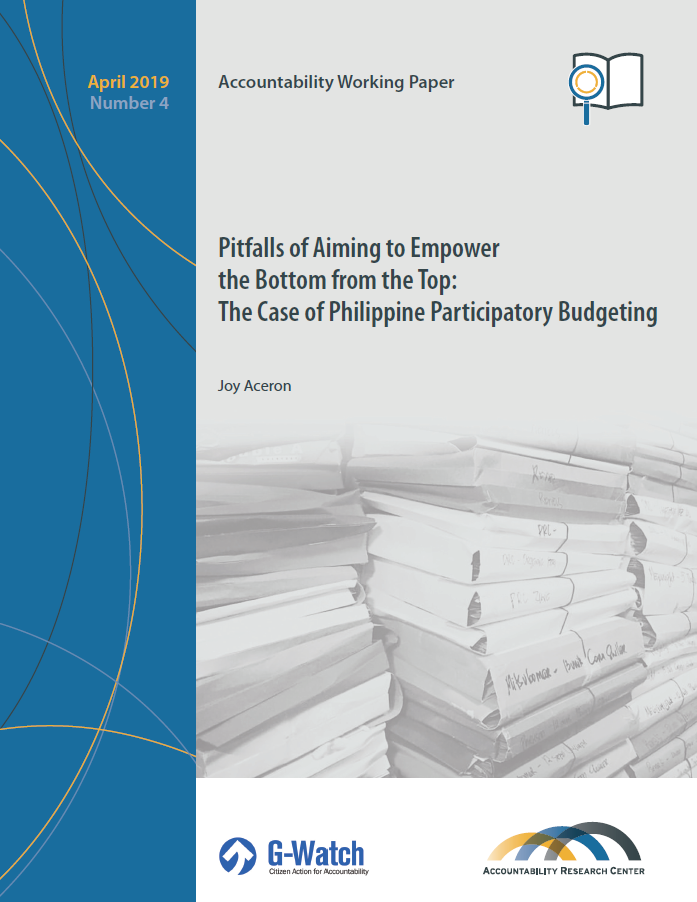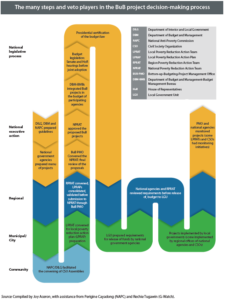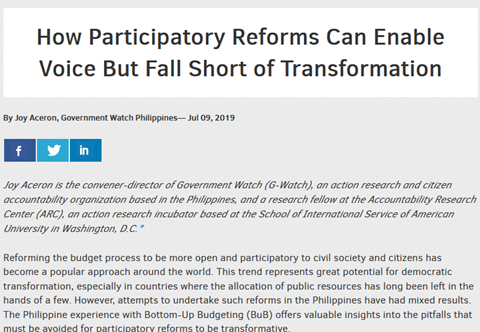
Pitfalls of Aiming to Empower the Bottom from the Top: The Case of Philippine Participatory Budgeting
Date: April 2019
Author(s): Joy Aceron
Publication type: Working Paper
Published by: G-Watch and Accountability Research Center
This paper explains why and how a reform program that opened up spaces for participatory budgeting was ultimately unable to result in pro-citizen power shifts that transformed governance. The study reviews the design and implementation of Bottom-Up Budgeting (BuB), the nationwide participatory budgeting (PB) program in the Philippines, which ran from 2012 to 2016 under the Benigno Aquino government. The findings underscore the importance of institutional design to participatory governance reforms. BuB’s goal was to transform local government by providing more space for civil society organizations (CSOs) to co-identify projects with the government and to take part in the budgeting process, but it did not strengthen CSO or grassroots capacity to hold their Local Government Units (LGUs) accountable. The BuB design had features that delivered positive gains towards citizen empowerment, including: (1) providing equal seats for CSOs in the Local Poverty Reduction Action Team (LPRAT), which are formally mandated to select proposed projects (in contrast to the pre-existing Local Development Councils (LDCs), which have only 25 percent CSO representation); (2) CSOs identified their LPRAT representatives themselves (as opposed to local chief executives choosing CSO representatives, as in the LDCs); and (3) LGUs were mandated to follow participatory requirements to receive additional funding. However, several aspects of the institutional design shifted power from local governments to the central government. This had a “centralizing effect”– namely: (1) there was a decision to bypass local government’s LDCs and create a new structure that was dependent on the central government; (2) the approval of each proposed project was subject to a tedious bureaucratic process and requirements by the national government which inadvertently created numerous veto players; (3) CSOs were limited to a pre-set menu of options of projects determined by national government agencies; (4) coordination was transferred from the National Anti-Poverty Commission (NAPC) to the Department of the interior and Local Government (DILG), and (5) the design failed to support a strong civil society component with a monitoring system that was well-coordinated, well-integrated, and had effective CSO oversight. This study argues that because of these design problems, BuB fell short in achieving its main political reform agenda of empowering the grassroots—particularly in enabling downward accountability that could have enabled lasting pro-citizen power shifts. It did not empower local civil society and citizens to become a countervailing force vis-à-vis local politicians in fiscal governance. BuB is a case of a reform that provided a procedural mechanism for civil society input into national agency decisions but was unable to improve government responsiveness. It provided civil society with ‘voice’, but was constrained in enabling ‘teeth’. Jonathan Fox (2014) refers to “voice” as citizen inputs, feedback and action, while “teeth” refer to the capacity of the state to respond to voice. Finally, the paper echoes the results of other studies which find that PB programs become successful when complemented by other institutional and state democratic capacity-building reforms and when they are part of a broader progressive change agenda. The BuB experience suggests that to bolster citizen oversight, it is essential to invest sufficient support and resources in citizen empowerment and in creating an enabling environment for citizen oversight.

Joy Aceron Joy Aceron is Convenor-Director of G-Watch, an action research organization in the Philippines working on accountability and citizen empowerment. She is also a research affiliate and advisor to Accountability Research Center (ARC), based in the School of International Service at American University, Washington DC. She graduated from the University of the Philippines-Diliman with a bachelor’s degree in political science and a master’s degree in public administration and public policy. She has almost two decades of experience in citizen monitoring, citizenship education and civil society-government engagement and has been invited to over 30 countries to speak in international conferences and to facilitate learning workshops. Joy has published works on political reform, civil society participation in governance and leadership, including most recently a book entitled Going Vertical: Citizen-Led Reform Campaigns in the Philippines. Formerly a program director and senior knowledge and practice leader at Ateneo School of Government for 10 years, Joy has been a board member of several civil society coalitions and advisory councils in the Philippines and abroad.

